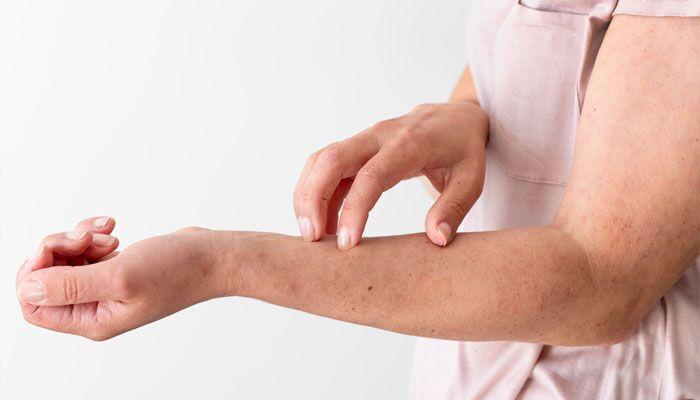Treatments Focus
Skin Allergies

It feels very embarrassing and painful when you have red, bumpy or itchy skin. There could be different reasons and one of them is due to allergic reactions. Itchy skin (pruritus) or skin rashes can also be caused when you are exposed to certain plants, food or medication reactions. Your skin is commonly involved in severe allergic reactions. But, sometimes it is also involved in chronic allergies like eczema (common in children) and urticaria (common in adults). The symptoms may appear both on and under your skin.
Eczema:
Also known as atopic dermatitis. It starts in infancy or early childhood. 10-20% of children and 1-3% of adults are affected. Dry, red, irritating and itchy skin are the common symptoms of eczema. Your skin may also develop small, fluid-filled bumps with clear or yellow fluid. A family history of allergy is observed in patients with eczema.
Atopic eczema can affect any part of your body. But, mostly it affects hands, elbows, back of knees, face and scalp in children.
Risk factors that can worsen the condition:
The exact cause of eczema is not known, but there are certain risk factors which can worsen your condition like
Food and environmental
allergens/irritants
heat or cold
stress
genetics
Diagnosis and treatment:
Your physician will examine your skin and check for family history. They may use patch test or other test to identify other skin conditions.
You may have to try different treatment methods for years to control this disease, but the symptoms can return again.
Urticaria:
Also known as hives, which are red, itchy and raised areas of skin. If the condition lasts only for 6 months, it is known as acute urticaria, that is mostly caused by exposure to allergen. They can range in size and appear anywhere on your body. They make you feel uncomfortable and can interfere with daily activities and sleep.
Symptoms of Urticaria:
Severe itching
(pruritus)
Batches of red or
skin coloured welts
Swelling of lips,
eyelids and throat
Causes of Urticaria:
Welts (raised red bumps) arises when your cells release some chemicals into your bloodstream. This skin reaction may be triggered by:
Food or drug
infections
insects or parasites
pressure on skin
sunlight
Diagnosis and treatment:
Physical examination and family history will help your doctor to identify for disease. Your doctor may also suggest you to undergo blood and skin tests.
Based on the severity of your signs and symptoms, your doctor will prescribe you medications and ointments or lotions.
FAQ's :
Research suggest that, there is an increased chance of developing eczema if you have a family history and can be inherited. Studies identified certain mutated (changes) genes that are linked to disease development.
According to research, gene test or genetic test reveals or identifies mutations (changes) in the genes in the people who are at high risk and further helping in treatment plan.
A person who has personal or family history of urticaria is at risk. Also, if you have newly developed or pre-existing allergies.
Acute urticaria or acute hives which appear suddenly will sometimes go away on their own within a day or two. But, certain type of urticaria may last for several weeks.
Wear cotton clothing that is loose-fitting. Several times a day, apply a cold compress to the irritated area, such as ice cubes wrapped in a washcloth—unless cold stimulates your hives. Anti-itch medicine can also be used.
What are macronutrients?
- Allergy and the skin: eczema and chronic urticaria. The Medical Journal of Australia. https://www.mja.com.au/journal/2006/185/9/5-allergy-and-skin-eczema-and-chronic-urticaria. Accessed on 25-03-2022.
- Atopic Dermatitis and Allergic Urticaria: Cutaneous manifestations of Immunodeficiency. PubMed Central. https://www.ncbi.nlm.nih.gov/pmc/articles/PMC5199140/. Accessed on 25-03-2022.
- Allergic Skin Conditions. American Academy of Allergy Asthma and Immunology. https://www.aaaai.org/tools-for-the-public/conditions-library/allergies/allergic-skin-conditions. Accessed on 25-03-2022.
- Atopic Eczema. NHS. https://www.nhs.uk/conditions/atopic-eczema/. Accessed on 25-03-2022.
- Skin Allergy. American Academy of Allergy Asthma and Immunology. https://acaai.org/allergies/allergic-conditions/skin-allergy/. Accessed on 25-03-2022.
- Chronic Hives. Mayo Clinic. https://www.mayoclinic.org/diseases-conditions/chronic-hives/symptoms-causes/syc-20352719#:~:text=Hives%20(urticaria)%20are%20red%2C,frequently%20over%20months%20or%20years. Accessed on 25-03-2022.
- Atopic Dermatitis (Eczema). Mayo Clinic. https://www.mayoclinic.org/diseases-conditions/atopic-dermatitis-eczema/symptoms-causes/syc-20353273. Accessed on 25-03-2022.
Related Articles
Book an Appointment to understand how GenepoweRx can help you in treating
Skin Allergies
Meet The Doctors
Dr Kalyan Uppaluri
Dr Hima Challa
Your genetics … Your Test ... Your Health Success
It’s always the word of mouth that’s the best advice. Here are some of our…


Our Partners






Professional Partnerships
Government Association

